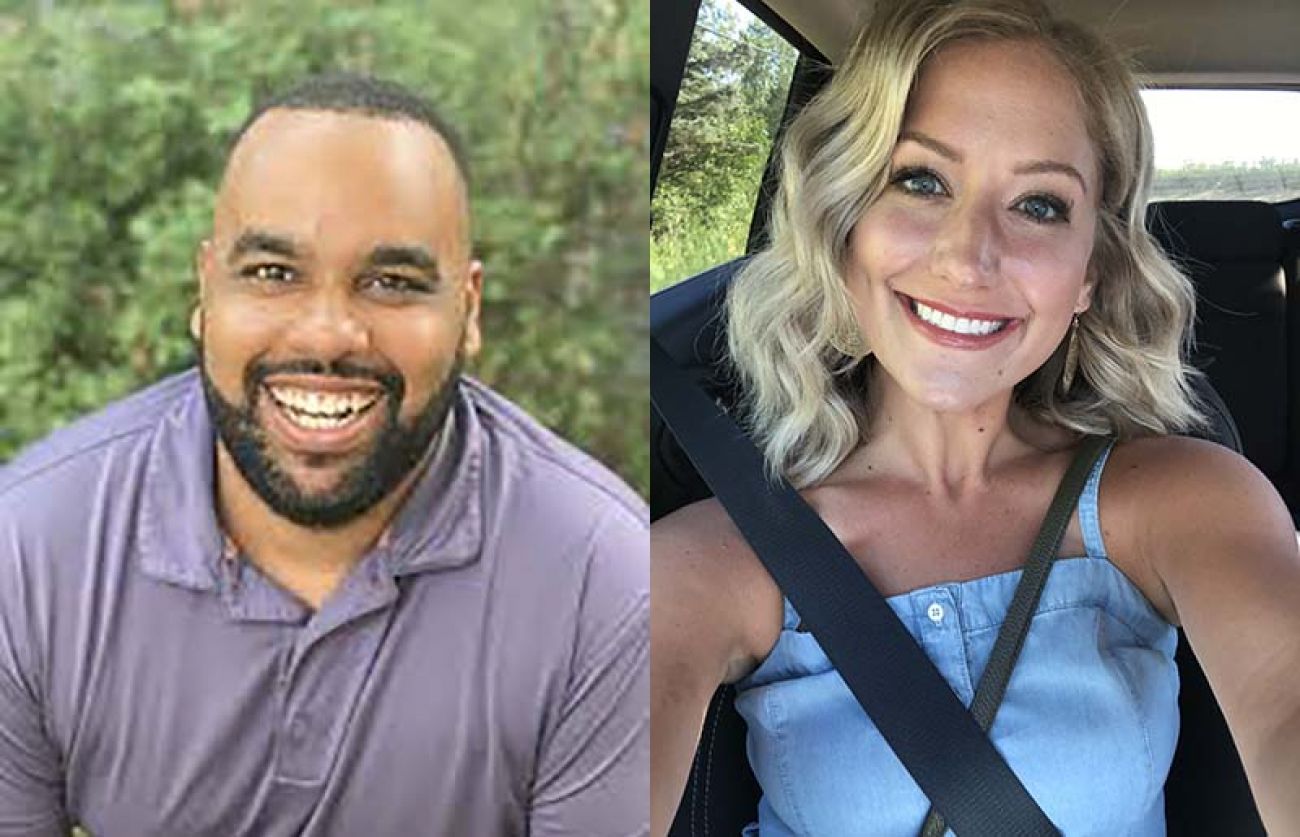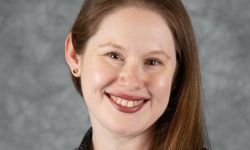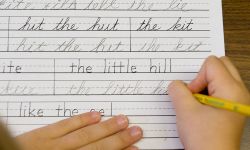Two Michigan educators work to keep new teachers in classrooms after COVID
Michigan teachers Anthony Barnes and Brittney Tylenda want young teachers to stay and grow in their profession.

Barnes, who is in his seventh year, teaches special education at Hillside Middle School in Kalamazoo. Tylenda, in her sixth year, teaches third grade in Manor Elementary at Monroe Public Schools.
Related:
- Michigan House nixes SAT essay and removes scores from transcripts
- No, bus drivers aren’t leading classes in Michigan, despite uproar over law
- Michigan advances bills to ease return of retired teachers to classrooms
Along with their day jobs, they hold leadership positions in their local teachers’ unions and work with their state union, the Michigan Education Association, to mentor and support new and early career educators. The program, Michigan New Educators (MiNE), has a total of six coordinators including Barnes and Tylenda.
They recently spoke with Bridge Michigan to share their experiences.
Barnes and Tylenda said there have been several challenges this year from students’ greater need for mental health support to the wider academic gap among students. But while living through a historic pandemic is exhausting, they said they feel more confident leading their students. They know each year in the classroom brings more skills to their teacher toolkits and they want to help new teachers develop those skills and stay in the profession.
Classrooms with wider gaps
“If there's been negative behavior, there's even more negative behaviors,” Barnes said. “If there's been positive academic growth for those gifted and talented students, that's there too…everything (is) just bigger than it was before.”
At Tylenda’s school in Monroe, students returned to the building in the last month of the 2020-2021 school year. Typically, students learn in earlier grades to wait their turn and raise their hands when they want to speak. They also learn how to problem solve with their peers so they don’t, for instance, tattletale when their classmate taps them on the head. But with the last school year almost completely remote, students had fewer opportunities to develop those skills.
“So things like that in third grade, typically are fizzled out by this point,” Tylenda said. “But let me tell you, it is almost April and they are still in full force.”
Tylenda knows she has to meet students where they are at.
“If I was a first year teacher coming into this, it would be a huge barrier because you have an expectation in your mind and then…you would probably perceive it more as like “what am I doing wrong?”
She doesn’t blame the students’ previous teachers. She knows teaching includes best practices like using small groups and hands on learning — skills that are harder to replicate during virtual learning.
So Tylenda adapts. Instead of teaching students cursive, she is using daily work to help students know when they need to capitalize letters in a sentence.
Barnes primarily teaches sixth and seventh grade students. He prides himself in knowing the fifth and eighth grade curriculum so he knows what students have already learned and what students will learn after leaving his classes.
But now, he said, he has to know even more because of gaps in learning. His current sixth grade students haven’t had a normal school year since third grade.
“I find myself consistently looking through elementary, preschool curriculum and figuring out, ‘OK, so this is how they learned to do multiplication. Let me take it two steps farther back than where I would normally to bridge that gap.’”
Knowing when to ask for help
Tylenda said her students need more mental health support.
She isn’t the only one. Educators told Chalkbeat Detroit that federal COVID-19 relief is helpful for hiring social workers and other mental health professionals but a labor shortage limits what schools can do.
While some schools are planning to hire more mental health professionals, others plan to integrate more social emotional learning in the classroom. At the same time, Gov. Gretchen Whitmer is calling for $361 million in her proposed budget to address student mental health and a recent group of advocates are calling for significant expansion in the number of school-based health centers across the state.
In Monroe County, Tylenda said she is thankful for restorative practices coordinators and student service providers but said her school does not have a person who can conduct a counseling session with a student.
Schools, she said, have a “severe need” for more mental health support.
She appreciates knowing that if a student is unable to calm down, she can have a different colleague help the student take a break and process their emotions. But she said if she were a first year teacher, she may not know that resource existed.
Just as teachers are trained to know when a student may need more help, Barnes said teachers need to be able to know when they need help, too. From using the school management technology to log attendance, to knowing that it’s OK to take some time off if you have a dying relative, Barnes said teachers need to feel like they can ask for help and receive it without judgment.
“We encourage our students to be vulnerable, and we encourage teachers to be vulnerable with our students,” Barnes said. “But we don't encourage our teachers to be vulnerable with each other. And through that vulnerability is where growth is going to happen.”
Both Barnes and Tylenda say teachers need to take care of themselves so they can serve their students.
“I wish I could say that I leave every day with a full bucket, right? I can say my bucket is never empty,” Barnes said.
Barnes finds “little victories” to add to his bucket.
Recently, a student told him he understood how to do an assignment calculating percentages using the example of purchasing a sweater and calculating the discount on it. It’s the same student who told him earlier this year “I’ve always been bad at math, I suck at math, I’m never going to get math.”
“Those things keep me motivated and keep me wanting to come back,” he said.
Tylenda said her “why” is building relationships with students, despite what she describes as a system that is “not getting better for us as educators.”
She noted several challenges, including staff shortages that mean teachers are taking on more responsibilities during the school day.
And she said most teachers she knows supplement their pay by working another job during the school year, working summer jobs or taking on extra responsibilities at school to make more money. Tylenda said she typically works as a waitress in the summer but last year she taught summer school and tutored students. She plans to tutor and teach again this summer.
Tylenda, 28, has a masters degree and makes $50,000 a year.
It’s not an ‘us versus them
As the teachers work to bring students up to speed, they acknowledge they can’t do it alone.
Tylenda experienced that sense of community recently when her principal organized a
school-wide sing along to Andy Grammer’s “Don’t Give Up on Me” where the principal pretended to play the guitar and students sang and danced.
Barnes said he knows there will always be some gap between people’s understanding of education and teachers’ expertise in education, but he said he really believes schools can move forward from the pandemic in a way that includes parents and community members.
“A lot of people, a lot of lawmakers, although a lot of them are well-intentioned, they don't know,” Barnes said. “And you don't know what you don't know, so ask.”
He said students’ parents and relatives can help with the substitute shortage, they can attend school board meetings, and they can find resources online.
“Teaching is very transparent, but people don't know that,” Barnes said. “So it seems shrouded in mystery. Well, let’s just work together. Let’s all just do one thing. And the sooner we do that, the better it will be for the kids.”
Michigan Education Watch
Michigan Education Watch is made possible by generous financial support from:
Subscribe to Michigan Education Watch
See what new members are saying about why they donated to Bridge Michigan:
- “In order for this information to be accurate and unbiased it must be underwritten by its readers, not by special interests.” - Larry S.
- “Not many other media sources report on the topics Bridge does.” - Susan B.
- “Your journalism is outstanding and rare these days.” - Mark S.
If you want to ensure the future of nonpartisan, nonprofit Michigan journalism, please become a member today. You, too, will be asked why you donated and maybe we'll feature your quote next time!






